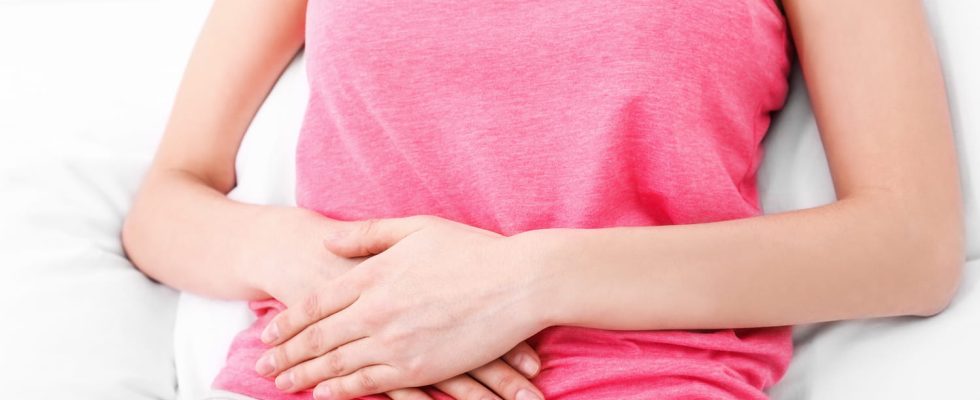Pelvic pain can have different causes including early pregnancy. If they are recurrent or accompanied by other symptoms, it is strongly recommended to consult a doctor.
Ovarian pain is actually pelvic pain, that is to say they are located in the small pelvis. But uno pain in lower intestines can be interpreted as ovarian pain. Indeed, it is often difficult to define if the pain comes from the ovary, the uterus, the bladder, the colon (if the pain is on the left side), or the appendix (if the pain is on the left side). right side). What are the causes pelvic pain? What do they mean? Pregnancy ? When to worry? How to relieve pelvic pain?
What causes pelvic pain?
“It is common to have pain in the lower abdomen when ovulation period (right in the middle of the cycle). Typically, this pain lasts approximately 24 hours, corresponds to a burning or pinching sensation in the lower abdomen and always occur at the same time, that is to say the middle of the menstrual cycle“, wants to reassure Dr. Raccah-Tebeka, gynecologist-endocrinologist. Ovulation corresponds to the expulsion of the egg from the ovaries and is accompanied by the release of a liquid which then circulates in the peritoneum, c is this sensation that can be perceived as painful. Pain in the lower abdomen can also intensify as menstruation approaches and during menstruation. Most of the time, this cyclical pain subsides by taking an analgesic such as paracetamol or ibuprofen. On the other hand, recurrent, sudden, intense pain accompanied by other symptoms may be the sign of a gynecological pathology like a pelvic infection (salpingitis), endometriosis, ovarian cyst or any other disease that impacts the organs located near the ovaries. A sexually transmitted infection must be quickly diagnosed and treated.
Are they a sign of pregnancy?
“Furthermore, in a patient who has pelvic pain and who has a late period or a forgotten pill, we can suspect the beginning of a pregnancy, or even an ectopic pregnancy“, she continues. In this case, it is important to carry out a pregnancy test and of make an appointment with a doctor.
When to worry about pelvic pain?
Depending on the intensity of the pain, its persistence and whether it is accompanied by other symptoms (bleeding, urinary symptoms such as a frequent desire to urinate, burns, digestive disorders, bloating, diarrhea, constipation, fever…), you should consult a doctor without delay. The latter will be able to prescribe additional examinations such as an ultrasound to establish a diagnosis of the origin of the problem. Sometimes, “the pain is so severe that it is safer to go directly to the emergency room. Generally, this happens when there is an ovarian cyst that ruptures or when it twists: the pain is accompanied by nausea, vomiting and sometimes digestive disorders. Surgical intervention is then often necessary. In all cases, pain in the lower abdomen which persists must lead to consultation“, says Dr. Raccah-Tebeka.
“To relieve pain immediately, you can take simple painkillers like paracetamol or antispasmodic like Spasfon. These drugs will not mask the pathology, but simply alleviate the pain“, advises Dr. Raccah-Tebeka.
► Pain that passes after taking an analgesic is not necessarily worrying.
► Pain that is reduced after taking an antispasmodic may be a sign of pain in the uterus or pain in the digestive system (the intestine is a little spasmed).
► If the pain remains significant, more powerful drugs should not be taken without consulting a doctor who, depending on the origin of the pain, will prescribe a adapted and individualized treatment (hormones, anti-inflammatories, other treatments…). This is why it is important for him to realize a clinical examination associated with other examinations to clarify its diagnosis.
Another tip: to soothe the pain, it is possible use a hot water bottle or take a hot shower. The effect of the heat will help relax the muscular contractures of the uterus. Staying hydrated is also very important because the uterus tends to tense when dehydrated.
Thanks to Dr. Brigitte Raccah-Tebeka, gynecologist-endocrinologist.
